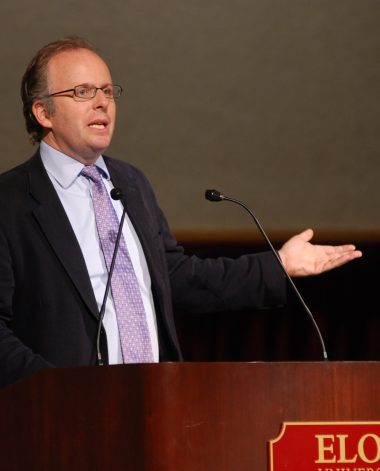Will China be the next world superpower, or will its political system implode as pressure builds from social inequalities that have appeared in recent years as economic advancements fuel its growth? NPR correspondent and China Road author Rob Gifford fears the latter, and in his Sept. 21 remarks as part of the 2010-11 Elon Common Reading Lecture, he shared with his audience why that’s the case.

China Road: A Journey into the Future of a Rising Power tells the story of the places visited, and people met, on journeys that Gifford made five years ago as part of his reporting duties with NPR. In the book, Gifford weaves Chinese history, economics, politics and culture into the narrative of his trip.
He concluded that China was on a precipice of sorts with a fragility that could push it over the edge and into social upheaval if the Communist Party wasn’t able to better handle the environmental, ethnic, political and economic disparities already visible to its people.
In 2010, that concern has receded, but not by much.
“I feel slightly less worried in the short term than I did then,” he said to a crowded Alumni Gym on Tuesday night. “Long term, I’m still worried. This idea, the inevitable rise of China, I’m not convinced that’s going to happen. China just has so many problems and the cost has been so great in meeting the problems that it has.”
Gifford used a laser pointer on a projected display to illustrate many of his views. He included photos from his book, plus other images of the varied terrains, and the many types of people, who make up modern China.
He said that despite the economic disparities between the urban middle class, with their cars and computers and jobs, and the rural residents who barely live on the food they grow, most people in China believe they will be able to improve their lives through work and by moving to cities where jobs are plentiful.
“The theme of hope is everywhere – everywhere! – in China today, a bit like the United States 100 years ago. People are just hungry for success and are very hopeful,” he said. However, that doesn’t mean problems have disappeared, especially as it relates to local government corruption. “It’s this tension between hope and despair that informs everything about your experience in China.”
Gifford first went to China in 1987 as a 22-year-old language student. He has spent much of his professional life studying and reporting from China. From 1999 to 2005, he served as Beijing correspondent for NPR, and traveled all over China and Asia reporting for “Morning Edition” and “All Things Considered.” He was NPR’s London correspondent from 2005 until this summer when he returned to China as Shanghai correspondent.
Gifford reported his adventure through the cast of characters he met along the way: in the factory towns of the coastal areas, in the rural heart of China and in the Gobi Desert. He saw the signs of a booming economy and the hope of those leaving their homes in search of a better existence. He recognized many of the historical and cultural frailties that have re-appeared as social, economic, and political fault lines which may hinder China’s rise.
Gifford’s visit is hosted by the Elon Common Reading Program. Each year, a reading is selected to challenge students, faculty, and staff to examine the local and global worlds they inhabit. The reading and related programs aim to encourage critical reflection about important issues and invite personal consideration of how individual actions can affect these issues.
He reflected on the success of his work in his opening remarks. “You slave away at writing this book, doing my day job at the same time, and thinking, ‘Is anyone going to read this?’” he said, noting that his journey on Route 312 was an attempt to see China through the eyes of its people at a grassroots level. “That’s really what we’re missing in the West. What are the lives of the Chinese people like?”


